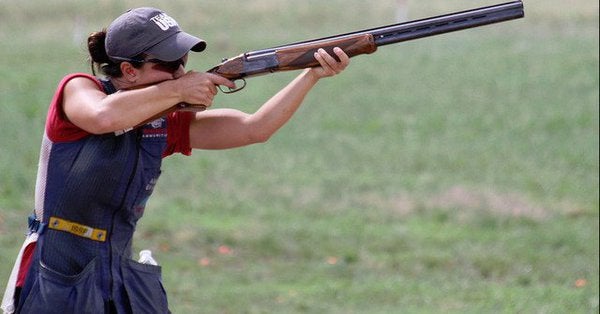I admit, I’m not a big fan of shooting firearms with heavy recoil anymore. It’s not that I dislike those types of guns, in fact I own multiple shotguns, surplus rifles, hunting rifles and other guns that make a big thump. I still shoot them regularly, but I just can’t take the abuse to my shoulder from the firearm recoil like I could in my youth. After a few mags I usually switch back to something a bit lighter. I’ve also added a hydraulic buffer tube like the KynSHOT to take a bit of the bite out of one of my favorite shotguns.
Another thing I’ve noticed while shooting guns with heavy recoil is a mild headache occasionally after a range session. I’ve always wondered how much of an effect all that force going into your shoulder had on your head. Then one day I noticed a new follower I had on Twitter and clicked on their profile, in their bio they had a link to a crowdfunding site Experiment.com. The link was to a project titled “Examining firearm recoil on neurometabolic changes associated with traumatic brain injury”. Huh? I never really thought about recoil potentially causing brain injury. The experiment linked above has been fully funded and is underway, I’m pretty interested in seeing the results of the study. Check out the excerpt from the experiment below:
About This Project
Sport concussion is currently a widely researched topic. Shooting sports do not impose a direct blow to the head but inflict rapid accelerations to the brain via recoil transfer. Repetitive gunshot recoil can impose neurometabolic change resulting in concussion like symptoms or traumatic brain injury (TBI). The impact of recoil on TBI is not determined. Evaluating brain specific blood biomarkers can contribute to neuroscience research in shooting sports, law enforcement and military.What is the context of this research?
Sports-related concussion is a widely researched topic which focuses on trauma from force on the head. Shooting sports impose a momentum transfer to the shooter but don’t inflict a direct blow to the head, therefore recoil has not been considered when assessing sport vulnerability for traumatic brain injury (TBI). However, repetitive gunshot inflicts multiple instances of acceleration to the body of the shooter and may contribute to altered brain biomarkers. Could consistent acceleration from gunshot recoil lead to metabolic brain alterations, therefore making athletes susceptible to TBI? Inspiration for the topic stems from a recent increase in concussion research in sport and review of skeet shooting discussion boards speaking of concussion symptoms following shooting.What is the significance of this project?
An underestimated value of 1.6-3.8 million concussions occur per year in U.S. sporting events. Trap and skeet discussion boards speak of concussive symptoms following a bout of shooting, however the sport has yet to study athlete vulnerability to TBI. Although recent research observes blast wave overpressure following gunshot, the chronic recoil exposure altering neurometabolic levels has yet to be measured. Establishing blood biomarkers for indication of TBI aids in efficient diagnosis of injury. If biomarkers indicate neurometabolic change associated with TBI in shooters, further research may be needed to reduce recoil energy and increase sport safety measures. Therefore, assessing TBI in shooters contributes to concussion research in shooting sports, police force, and military.What are the goals of the project?
The purpose of this research is to examine the effects of firearm recoil during skeet and trap shooting on neurometabolic changes associated with TBI. The study aims to determine the presence of TBI by measuring brain specific, FDA approved proteins GFAP, UCH-L1, and S100B (not FDA approved) following a round of trap/ skeet shooting. Biomarkers will be measured via blood draw at three points. First, after an initial washout period, one week of no shooting. Second, immediately (within 1 hour) post shooting. Third, 24 hours after the shooting session. Changes in proteins will be analyzed to confirm or refute the possibility of TBI. If neurometabolic alterations occur, physiological differences in shooters and firearm recoil energy will be compared and evaluated.Additional Information
Degree of TBI can differ from sub concussion, mild TBI/concussion, or severe TBI. Indications of each classification can overlap and vary as symptoms either absent, worsen, subside, or remain consistent. Sub-concussive head impacts, for example, are common in many sports but are highly misdiagnosed and often go untreated. When exposed to repetitive minor impacts, such as repetitive gunshot recoil, abnormalities in cellular metabolism, membrane fluidity, neuro-inflammation, synaptic function, tearing of axons, and structural integrity of the brain may occur. These neurometabolic changes have been found in sub-concussive impacts without symptoms of TBI or alteration in cognitive function. No definitive threshold values for subtypes of TBI has been established. Competition and recreation shooting sports have yet to be analyzed for TBI vulnerability.Clay pigeon shooting is a sport which offers a variety of levels from novice to Olympic competition. In 2017, a total of 5.08 million participants were recorded to have been involved in the sport. Athletes typically use a 12-gauge shotgun, however, 20-gauge, 16 gauge, etc shotguns are options as well. Two major disciplines of clay shooting are trap and skeet. Down the line (DTL) is the most common trap discipline which totals a minimum of 25 cartridges per round. The total number of shots in a round of skeet is 25. The 25+ gunshots (as many as 100 or more) in each competition inflicts multiple instances of recoil transfer to the shooter. If recoil transfer interferes with neurometabolic function, the shooter may be susceptible to TBI.
 Your Privacy Choices
Your Privacy Choices
